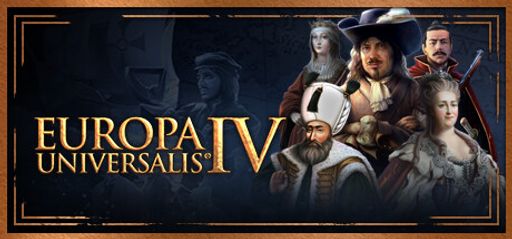 I’m kicking this off by saying Europa Universalis IV is a beast of a strategy game from Paradox Development Studio and published by Paradox Interactive. As someone who loves shaving off a few seconds here and there, the mechanics—while dense—offer plenty of opportunities to optimize your play. The innovative historical decision-making enables you to slice through centuries of conflict if you know where to push your speedrun. I love how the game’s world map is not only gorgeous but also full of routes and quick transitions between conflicts. Sure, some players have grumbled about the DLC policies and the added fluff over the base game, but I see it as an opportunity to further challenge yourself by mastering additional layers of strategy.
I’m kicking this off by saying Europa Universalis IV is a beast of a strategy game from Paradox Development Studio and published by Paradox Interactive. As someone who loves shaving off a few seconds here and there, the mechanics—while dense—offer plenty of opportunities to optimize your play. The innovative historical decision-making enables you to slice through centuries of conflict if you know where to push your speedrun. I love how the game’s world map is not only gorgeous but also full of routes and quick transitions between conflicts. Sure, some players have grumbled about the DLC policies and the added fluff over the base game, but I see it as an opportunity to further challenge yourself by mastering additional layers of strategy.
 Absolutely, Speedy. Europa Universalis IV is a goldmine for someone who enjoys diving into every historical twist and side event. Developed with such dedication by Paradox, every province and event is meticulously designed. I love exploring the intricate details, from the political alliances to the hidden events during the Reformation. For those who get lost in candlelit study of every national decision, the game practically rewards thorough playthroughs. And yes, while the DLC can seem a bit pricey, it does add layers of nuance to the historical narrative and mechanics, making every conquest and treaty feel more authentic.
Absolutely, Speedy. Europa Universalis IV is a goldmine for someone who enjoys diving into every historical twist and side event. Developed with such dedication by Paradox, every province and event is meticulously designed. I love exploring the intricate details, from the political alliances to the hidden events during the Reformation. For those who get lost in candlelit study of every national decision, the game practically rewards thorough playthroughs. And yes, while the DLC can seem a bit pricey, it does add layers of nuance to the historical narrative and mechanics, making every conquest and treaty feel more authentic.
 I completely agree with you both. For an explorer who thrives on discovering historical secrets and elaborate world-building, Europa Universalis IV delivers a truly immersive experience. The game takes you on a journey from the late Middle Ages to the Napoleonic era, and its expansive map and dynamic events keep you intrigued every step of the way. Paradox’s dedication to historical accuracy really shines here. The narrative arcs—whether it’s in the art of war during the Thirty Years War expansion or the intricate diplomacy in the Common Sense expansion—ensure that every campaign feels unique and loaded with surprises. It may seem daunting at first, but if you step into it with a spirit of adventure and a willingness to learn, it’s a rewarding ride.
I completely agree with you both. For an explorer who thrives on discovering historical secrets and elaborate world-building, Europa Universalis IV delivers a truly immersive experience. The game takes you on a journey from the late Middle Ages to the Napoleonic era, and its expansive map and dynamic events keep you intrigued every step of the way. Paradox’s dedication to historical accuracy really shines here. The narrative arcs—whether it’s in the art of war during the Thirty Years War expansion or the intricate diplomacy in the Common Sense expansion—ensure that every campaign feels unique and loaded with surprises. It may seem daunting at first, but if you step into it with a spirit of adventure and a willingness to learn, it’s a rewarding ride.
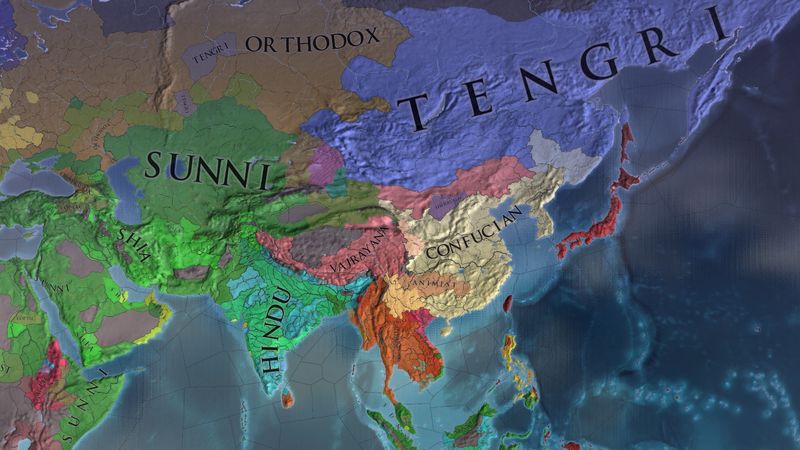
 From a hardcore competitive perspective, Europa Universalis IV brims with strategic complexity. The game’s mechanics enable you to fine-tune everything from trade flows to military composition, requiring you to master both macro and micro management. I appreciate the level of challenge that Paradox has embedded in things like monarch personality effects and national ideas—each decision can tip the balance of power. I often compare its tactical elements to Crusader Kings III and Hearts of Iron IV, where every campaign is a negotiation between brute force and diplomatic finesse. For players who love deep strategy and competitive challenges, this game serves as an endless arena for refining your tactics.
From a hardcore competitive perspective, Europa Universalis IV brims with strategic complexity. The game’s mechanics enable you to fine-tune everything from trade flows to military composition, requiring you to master both macro and micro management. I appreciate the level of challenge that Paradox has embedded in things like monarch personality effects and national ideas—each decision can tip the balance of power. I often compare its tactical elements to Crusader Kings III and Hearts of Iron IV, where every campaign is a negotiation between brute force and diplomatic finesse. For players who love deep strategy and competitive challenges, this game serves as an endless arena for refining your tactics.
 Speaking of mechanics, the controls and in-game menus might seem complex at first, but they’re designed to give you direct access to every minute detail of statecraft. Although it’s not a twitch-reflex game, if you practice and even learn a few shortcuts, navigating the centuries becomes a fluid experience. The game engine—built with impressive attention to historical data—allows rapid calculations and immediate feedback, which is essential when you’re trying to shave off critical seconds in a lengthy session.
Speaking of mechanics, the controls and in-game menus might seem complex at first, but they’re designed to give you direct access to every minute detail of statecraft. Although it’s not a twitch-reflex game, if you practice and even learn a few shortcuts, navigating the centuries becomes a fluid experience. The game engine—built with impressive attention to historical data—allows rapid calculations and immediate feedback, which is essential when you’re trying to shave off critical seconds in a lengthy session.
 On that note, the game’s depth in gameplay mechanics is phenomenal. The way Paradox Interactive has layered events and national systems demands that you explore every nook of the map. The interplay between religious reformations, monarchical decisions, and even the aesthetics of unit art is what makes each playthrough distinct. I can spend hours combing through the unique triggers and finding every hidden achievement, and that level of detail is what keeps me coming back. The DLC may add extra complexities, but for a true completionist, it’s like unlocking bonus chapters in a richly illustrated history book.
On that note, the game’s depth in gameplay mechanics is phenomenal. The way Paradox Interactive has layered events and national systems demands that you explore every nook of the map. The interplay between religious reformations, monarchical decisions, and even the aesthetics of unit art is what makes each playthrough distinct. I can spend hours combing through the unique triggers and finding every hidden achievement, and that level of detail is what keeps me coming back. The DLC may add extra complexities, but for a true completionist, it’s like unlocking bonus chapters in a richly illustrated history book.
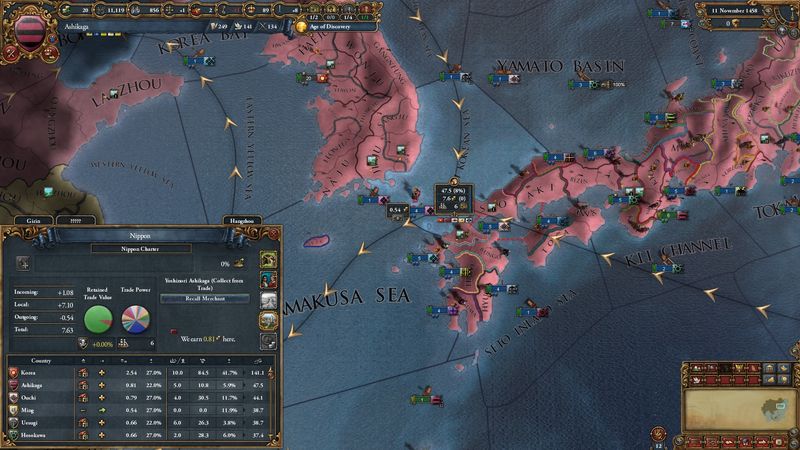
 And the narrative truly hooks you. Europa Universalis IV doesn’t spoon-feed a single linear storyline—it presents you with a living, breathing world full of unexpected twists. You might start as a minor duchy and end up altering history through bold diplomacy or ruthless warfare. Paradox’s intent is clear: empower you to write your own history. The pacing, while deliberate, allows you to savor key historical moments, whether it’s witnessing the artistic visuals of a Renaissance court or the gritty realism of a continental conflict. It’s like stepping into a time machine and rewriting the rules of global domination.
And the narrative truly hooks you. Europa Universalis IV doesn’t spoon-feed a single linear storyline—it presents you with a living, breathing world full of unexpected twists. You might start as a minor duchy and end up altering history through bold diplomacy or ruthless warfare. Paradox’s intent is clear: empower you to write your own history. The pacing, while deliberate, allows you to savor key historical moments, whether it’s witnessing the artistic visuals of a Renaissance court or the gritty realism of a continental conflict. It’s like stepping into a time machine and rewriting the rules of global domination.
 I’d add that the story isn’t just background fluff but feeds directly into how you shape your nation. The strategic implications behind your decisions—be it managing diplomatic alliances or waging wars—are intertwined with evolving character traits and national personalities. For a competitive player, these elements heighten the challenge, requiring you to constantly re-evaluate your strategy as the geopolitical landscape shifts. It’s akin to playing an endless chess match with history itself.
I’d add that the story isn’t just background fluff but feeds directly into how you shape your nation. The strategic implications behind your decisions—be it managing diplomatic alliances or waging wars—are intertwined with evolving character traits and national personalities. For a competitive player, these elements heighten the challenge, requiring you to constantly re-evaluate your strategy as the geopolitical landscape shifts. It’s akin to playing an endless chess match with history itself.
 Let’s talk visuals and graphics for a minute. The artistic direction and detailed maps in Europa Universalis IV make the game not only functional but a visual treat. The design, inspired by historical cartography, is both functional and immersive, with color palettes that enhance the mood of each era. Whether you’re navigating through the fog of war or charting trade routes, the graphics serve a dual purpose of clarity and atmosphere. It’s a testament to how Paradox approaches game design—a blend of precision and aesthetic charm.
Let’s talk visuals and graphics for a minute. The artistic direction and detailed maps in Europa Universalis IV make the game not only functional but a visual treat. The design, inspired by historical cartography, is both functional and immersive, with color palettes that enhance the mood of each era. Whether you’re navigating through the fog of war or charting trade routes, the graphics serve a dual purpose of clarity and atmosphere. It’s a testament to how Paradox approaches game design—a blend of precision and aesthetic charm.
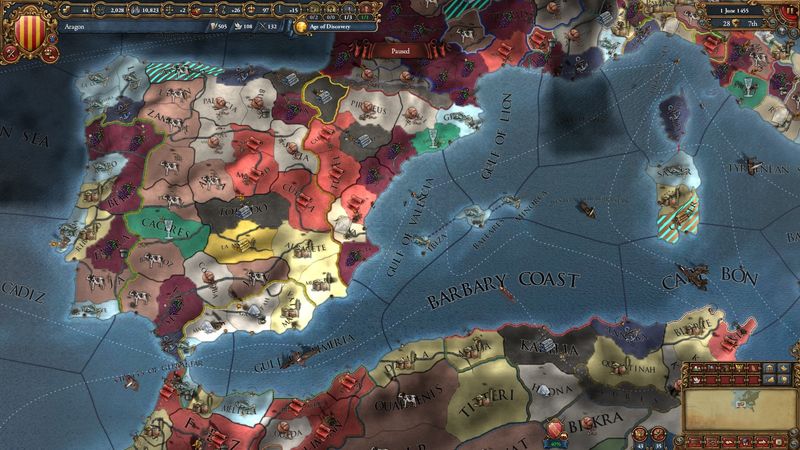
 Exactly. The art style pays homage to the era it represents, using detailed province maps and beautifully designed unit art that reference historical paintings and cartographic styles. It feels like every visual element has purpose; from the majestic portraits of monarchs to the subtle changes in architecture during different periods. The game’s engine supports smooth transitions, which makes the sometimes hectic gameplay even more accessible for someone who likes to examine every detail.
Exactly. The art style pays homage to the era it represents, using detailed province maps and beautifully designed unit art that reference historical paintings and cartographic styles. It feels like every visual element has purpose; from the majestic portraits of monarchs to the subtle changes in architecture during different periods. The game’s engine supports smooth transitions, which makes the sometimes hectic gameplay even more accessible for someone who likes to examine every detail.
 Meanwhile, the audio design complements the visuals brilliantly. The orchestral score is evocative of the period, with tracks that occasionally feel heroic and sometimes imbued with a sense of foreboding, perfectly mirroring the game’s many twists. Regional themes—like those inspired by Ottoman or Renaissance tunes—add depth to the immersion. Environmental sound effects, such as the clash of swords and the murmur of diplomatic gatherings, heighten the experience substantially.
Meanwhile, the audio design complements the visuals brilliantly. The orchestral score is evocative of the period, with tracks that occasionally feel heroic and sometimes imbued with a sense of foreboding, perfectly mirroring the game’s many twists. Regional themes—like those inspired by Ottoman or Renaissance tunes—add depth to the immersion. Environmental sound effects, such as the clash of swords and the murmur of diplomatic gatherings, heighten the experience substantially.
 Yes, the sound design is finely tuned to mirror the gameplay mechanics. In high-stakes moments, the soundtrack intensifies the tension, which is crucial for making split-second decisions in warfare or diplomacy. Even voice lines during pivotal events are carefully orchestrated to add character depth. Though admittedly, some lines could benefit from more dramatic delivery. Nevertheless, the overall audio experience keeps players engaged, tying each element of statecraft to its historical inspiration.
Yes, the sound design is finely tuned to mirror the gameplay mechanics. In high-stakes moments, the soundtrack intensifies the tension, which is crucial for making split-second decisions in warfare or diplomacy. Even voice lines during pivotal events are carefully orchestrated to add character depth. Though admittedly, some lines could benefit from more dramatic delivery. Nevertheless, the overall audio experience keeps players engaged, tying each element of statecraft to its historical inspiration.
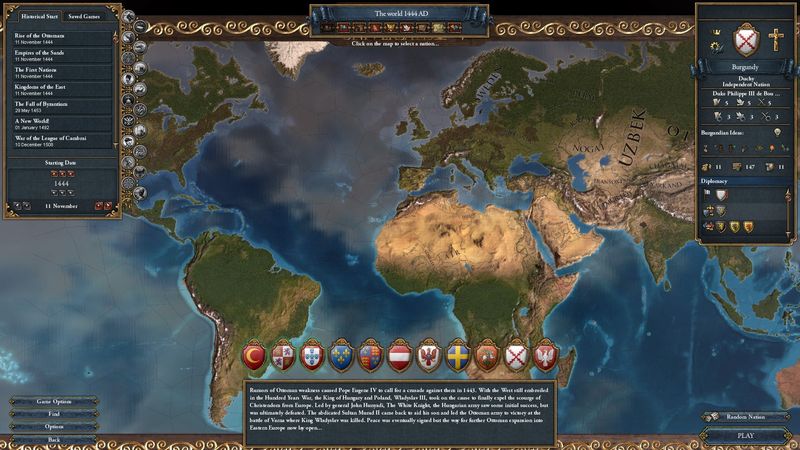
 Speaking of characters, Europa Universalis IV is more about ruling nations than following individual heroes. However, the personalities of monarchs, advisors, and military leaders add an extra layer of depth. Each character comes with unique traits that affect gameplay. Which is a gold mine for speedrunners looking to optimize every move. I love that even a small decision tied to a character’s backstory could cause a ripple effect across centuries!
Speaking of characters, Europa Universalis IV is more about ruling nations than following individual heroes. However, the personalities of monarchs, advisors, and military leaders add an extra layer of depth. Each character comes with unique traits that affect gameplay. Which is a gold mine for speedrunners looking to optimize every move. I love that even a small decision tied to a character’s backstory could cause a ripple effect across centuries!
 The rich variety of characters is one of my favorite aspects. The game’s attention to historical figures allows you to feel the weight of history as you guide your nation. The diversity here isn’t just a modern nod to inclusivity. It’s in the historical realities of diplomacy, war, and internal politics. Each monarch’s arc, for instance, tells a story that binds directly to the nation’s fate. Making every playthrough a unique narrative adventure.
The rich variety of characters is one of my favorite aspects. The game’s attention to historical figures allows you to feel the weight of history as you guide your nation. The diversity here isn’t just a modern nod to inclusivity. It’s in the historical realities of diplomacy, war, and internal politics. Each monarch’s arc, for instance, tells a story that binds directly to the nation’s fate. Making every playthrough a unique narrative adventure.
 Challenges in Europa Universalis IV are as expansive as its historical canvas. There are environmental challenges like managing overextension during war, balancing internal reforms, and meeting diplomatic pressures from rival nations. While some might find the learning curve steep, the game offers a rewarding progression curve that adapts with your skills. Whether you’re engaging in intense combat, navigating tricky diplomatic waters, or balancing economic management, every decision poses a meaningful challenge.
Challenges in Europa Universalis IV are as expansive as its historical canvas. There are environmental challenges like managing overextension during war, balancing internal reforms, and meeting diplomatic pressures from rival nations. While some might find the learning curve steep, the game offers a rewarding progression curve that adapts with your skills. Whether you’re engaging in intense combat, navigating tricky diplomatic waters, or balancing economic management, every decision poses a meaningful challenge.
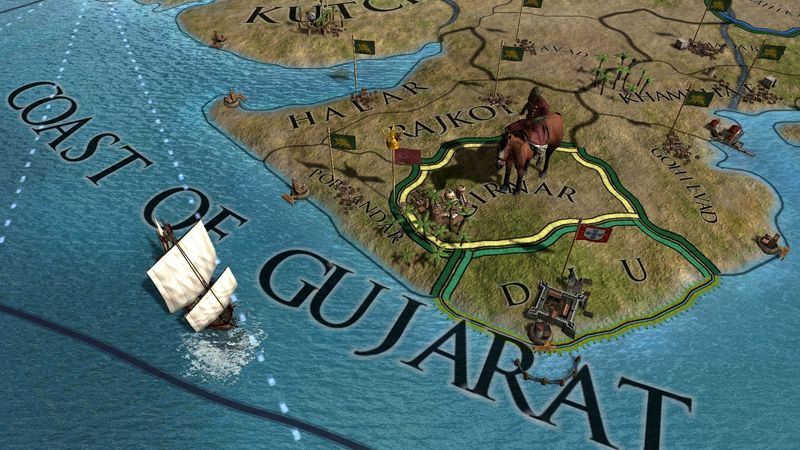
 The difficulty in Europa Universalis IV operates on multiple levels. It challenges players to think several moves ahead, blending strategic planning with real-time adjustments. The game’s depth means you’ll face both expected and unforeseen challenges—ranging from unpredictable alliances to sudden rebellions. I appreciate that even if a strategy doesn’t work, it is a learning opportunity. A chance to refine your approach against historical odds.
The difficulty in Europa Universalis IV operates on multiple levels. It challenges players to think several moves ahead, blending strategic planning with real-time adjustments. The game’s depth means you’ll face both expected and unforeseen challenges—ranging from unpredictable alliances to sudden rebellions. I appreciate that even if a strategy doesn’t work, it is a learning opportunity. A chance to refine your approach against historical odds.
 And when it comes to replay value, you have endless avenues to explore. The game encourages multiple playthroughs thanks to its branching historical events and customizable gameplay. I’ve seen players start as one nation and completely change the historical narrative by using different expansions and DLC content. This is especially appealing for those who enjoy speedrunning—every run might offer different shortcuts or new strategies to master!
And when it comes to replay value, you have endless avenues to explore. The game encourages multiple playthroughs thanks to its branching historical events and customizable gameplay. I’ve seen players start as one nation and completely change the historical narrative by using different expansions and DLC content. This is especially appealing for those who enjoy speedrunning—every run might offer different shortcuts or new strategies to master!
 Indeed. Europa Universalis IV’s depth ensures a high replayability factor. With every session, you can set new personal goals. Such as completing every achievement, exploring alternate historical outcomes, or simply collecting every hidden event. Compared to other grand strategy games, it really stands out for its ability to continuously surprise you.
Indeed. Europa Universalis IV’s depth ensures a high replayability factor. With every session, you can set new personal goals. Such as completing every achievement, exploring alternate historical outcomes, or simply collecting every hidden event. Compared to other grand strategy games, it really stands out for its ability to continuously surprise you.
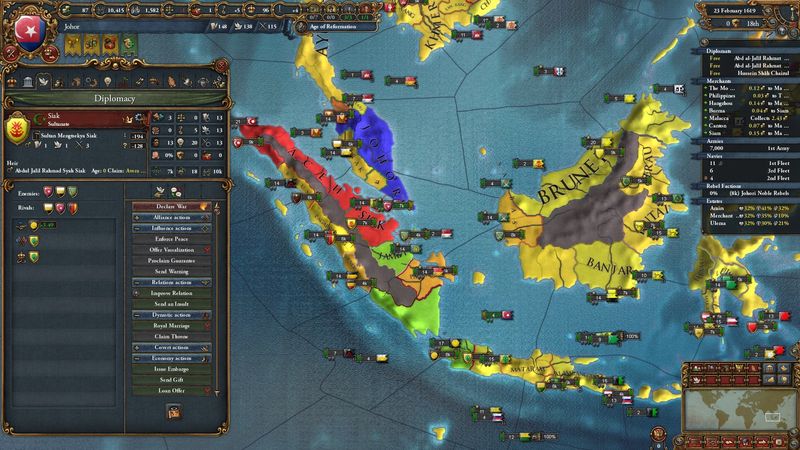
 To sum up, Europa Universalis IV is a rich, multifaceted experience that caters to players from all backgrounds. Whether you’re here for detailed exploration, competitive strategy, or a speedy campaign. It’s a game where the storytelling, visuals, and mechanics all come together seamlessly. Inviting you to write your own piece of history.
To sum up, Europa Universalis IV is a rich, multifaceted experience that caters to players from all backgrounds. Whether you’re here for detailed exploration, competitive strategy, or a speedy campaign. It’s a game where the storytelling, visuals, and mechanics all come together seamlessly. Inviting you to write your own piece of history.
 In the end, what makes Europa Universalis IV unique? Its remarkable blend of historical depth, strategic complexity, and dynamic gameplay. It challenges you in ways few games do. Providing a platform to test your tactics and immerse you in a living, breathing world of historical conflict and diplomacy.
In the end, what makes Europa Universalis IV unique? Its remarkable blend of historical depth, strategic complexity, and dynamic gameplay. It challenges you in ways few games do. Providing a platform to test your tactics and immerse you in a living, breathing world of historical conflict and diplomacy.
 For those intrigued by this epic historical strategy adventure, you might also enjoy these. Crusader Kings III—which digs deep into dynastic politics and personal stories. Hearts of Iron IV—for its intense focus on military strategy and global conflict. Civilization VI—for its turn-based empire building with vibrant visuals. Total War: Three Kingdoms for a blend of real-time tactics and grand strategy in a historical setting. Stellaris, which, although set in space, offers deep and innovative strategy mechanics akin to Paradox’s rich design.
For those intrigued by this epic historical strategy adventure, you might also enjoy these. Crusader Kings III—which digs deep into dynastic politics and personal stories. Hearts of Iron IV—for its intense focus on military strategy and global conflict. Civilization VI—for its turn-based empire building with vibrant visuals. Total War: Three Kingdoms for a blend of real-time tactics and grand strategy in a historical setting. Stellaris, which, although set in space, offers deep and innovative strategy mechanics akin to Paradox’s rich design.
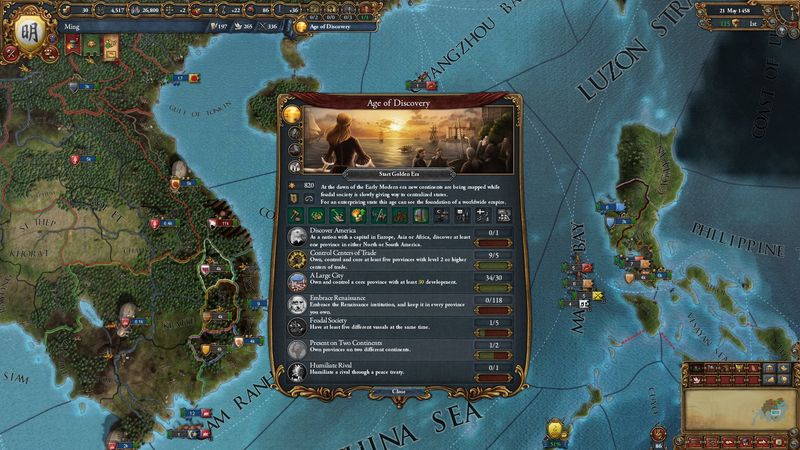
 Absolutely, these games each carry that same passion for historical detail and expansive gameplay. Every one of them offers a unique twist on strategy that can keep us all engaged for hours on end.
Absolutely, these games each carry that same passion for historical detail and expansive gameplay. Every one of them offers a unique twist on strategy that can keep us all engaged for hours on end.
 It’s amazing how Paradox Interactive continues to set the benchmark for historical strategy gaming. No matter what your approach, there’s a world of history waiting to be rewritten. Whether meticulously exploring every niche or racing against the clock.
It’s amazing how Paradox Interactive continues to set the benchmark for historical strategy gaming. No matter what your approach, there’s a world of history waiting to be rewritten. Whether meticulously exploring every niche or racing against the clock.
 I couldn’t agree more. Europa Universalis IV stands as a testimony to thoughtful game design and the power of deep historical simulation. It challenges, educates, and entertains—qualities that make it a must-play in the strategy genre.
I couldn’t agree more. Europa Universalis IV stands as a testimony to thoughtful game design and the power of deep historical simulation. It challenges, educates, and entertains—qualities that make it a must-play in the strategy genre.
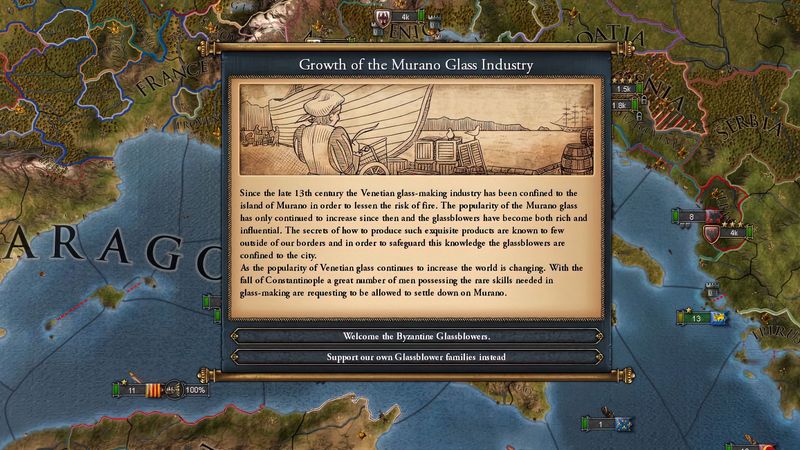
 Well said, everyone! If you’re looking for a game that lets you carve your own legacy, Europa Universalis IV is definitely worth it. With plenty of strategies to master and secrets to uncover.
Well said, everyone! If you’re looking for a game that lets you carve your own legacy, Europa Universalis IV is definitely worth it. With plenty of strategies to master and secrets to uncover.

